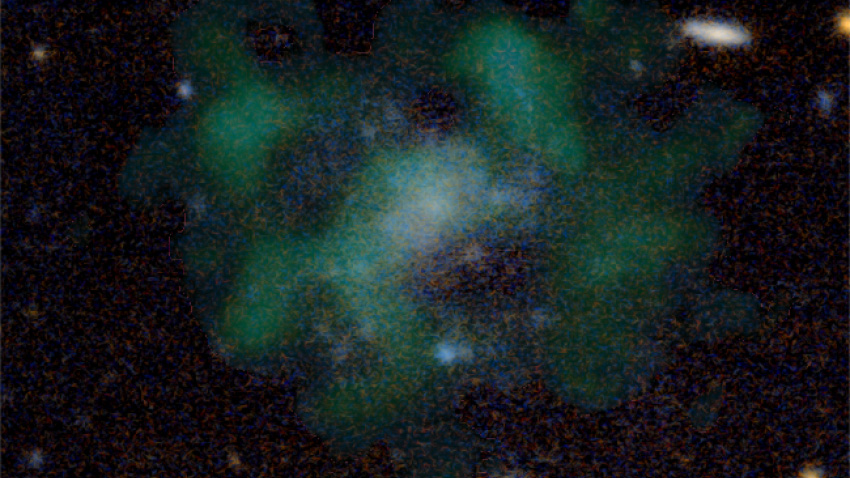This weird galaxy is missing all of its dark matter and scientists can't explain it
Theory predicts that sparse galaxies have to be held together by dark matter.

Astronomers are wondering what holds together a distant galaxy that appears to contain no trace of dark matter.
The galaxy, called AGC 114905, is located some 250 million light-years away from Earth and is about as large as the Milky Way. This distant galaxy, however, contains a thousand times fewer stars than our galactic home.
According to theoretical models, such sparse galaxies must be held together by dark matter, the mysterious invisible stuff that according to estimates makes up about 85% of all matter in the universe. But when astronomers measured AGC 114905 using the Very Large Array in New Mexico, they found that this strange galaxy contains absolutely none.
Gallery: Dark matter throughout the universe
The team, led by Pavel Mancera Piña, an astronomer at the University of Groningen in the Netherlands and the Netherlands Institute for Radio Astronomy (ASTRON), didn't choose to study AGC 114905 by chance.
Previous observations indicated that this galaxy, as well as five others, might be very poor in dark matter. But the findings were so at odds with theory that Mancera Piña and his colleagues decided to measure again.
However, even after 40 hours of measurements with one of the most powerful radio telescopes in the world, the researchers found no dark matter whatsoever.
Get the Space.com Newsletter
Breaking space news, the latest updates on rocket launches, skywatching events and more!
"This is, of course, what we thought and hoped for because it confirms our previous measurements," Mancera Piña said in a statement. "But now the problem remains that the theory predicts that there must be dark matter in AGC 114905, but our observations say there isn't. In fact, the difference between theory and observation is only getting bigger."
AGC 114905 is not the first galaxy devoid of dark matter discovered by astronomers. In 2018, a team led by Yale University astronomer Pieter van Dokkum found that a galaxy called NGC 1052-DF2, some 60 million light-years away from Earth, appears to contain no dark matter. However, the techniques and measurements used in the recent study by Mancera Piña are more robust than that work, the scientists said in the new statement.
The scientists think that their galaxy could have been stripped of its dark matter by another, more massive nearby galaxy. The strange thing, however, is that there seems to be no galaxy capable of such a feat in the vicinity of AGC 114905.
Meanwhile, the researchers are examining a second ultra-diffuse dwarf galaxy from their original set of six. If they find no trace of dark matter in that galaxy too, it will make the case for dark matter poor galaxies even stronger, the scientists said in the statement.
The study was published in the journal Monthly Notices of the Royal Astronomical Society on Monday (Dec. 6).
Follow Tereza Pultarova on Twitter @TerezaPultarova. Follow us on Twitter @Spacedotcom and on Facebook.
Join our Space Forums to keep talking space on the latest missions, night sky and more! And if you have a news tip, correction or comment, let us know at: community@space.com.

Tereza is a London-based science and technology journalist, aspiring fiction writer and amateur gymnast. Originally from Prague, the Czech Republic, she spent the first seven years of her career working as a reporter, script-writer and presenter for various TV programmes of the Czech Public Service Television. She later took a career break to pursue further education and added a Master's in Science from the International Space University, France, to her Bachelor's in Journalism and Master's in Cultural Anthropology from Prague's Charles University. She worked as a reporter at the Engineering and Technology magazine, freelanced for a range of publications including Live Science, Space.com, Professional Engineering, Via Satellite and Space News and served as a maternity cover science editor at the European Space Agency.









